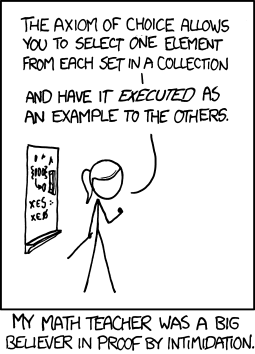
I happened onto a logic blog recently and, before my eyes burnt out with the beauty of the abstractions involved, I learned a new term. ZFC Set Theory.
The first two letters, "ZF," abbreviate names, Zemelo and Frankel. Both big names in the history of logic -- I need say no more of them now. The C stands for "choice" as in the "axiom of choice."
Now, that sounds important. What choice can there be in logic?
Well, the axiom of choice involves mutually disjoint nonempty sets. Take for example two such sets: the set of all teacups and the set of all named bodies of water on the planet. The axiom of choice means that for any set of such sets, it is possible to create a transversal set, containing exactly one element from each. Simple enough in this case: I can simple designate one set as consistent of teacup A plus Lake Erie. Another set consists of teacup B plus the Atlantic Ocean. And so forth.
Why is this important? Well, Bertrand Russell in 1904 (when this axiom, and in fact set theory, were new) said that this axiom yields the multiplicative theorem: that is, the conclusion that any multiplication of two non-zero numbers yields a non-zero number. And THAT marked a milestone in the project of creating a set theoretic foundation for arithmetic.
The significance of ZFC Set Theory, then, is or includes this -- there is a claim circulating among logicians and philosophers of mathematics that if ANY form of set theory can serve as a foundation for arithmetic, or more ambitiously still for mathematics as such, then ZFC Set Theory is the best candidate for the job.
Now YOUR eyes may be burning, dear reader, so I desist.
Set theory can be used to compare and contrast. Using a Venn Diagram Maker we can create venn diagrams of 2-sets, 3-sets/4-sets or get creative with the app Creately. There are 100s of diagram templates and examples to be used freely in the diagram community of Creately online diagramming and collaboration software.
ReplyDelete